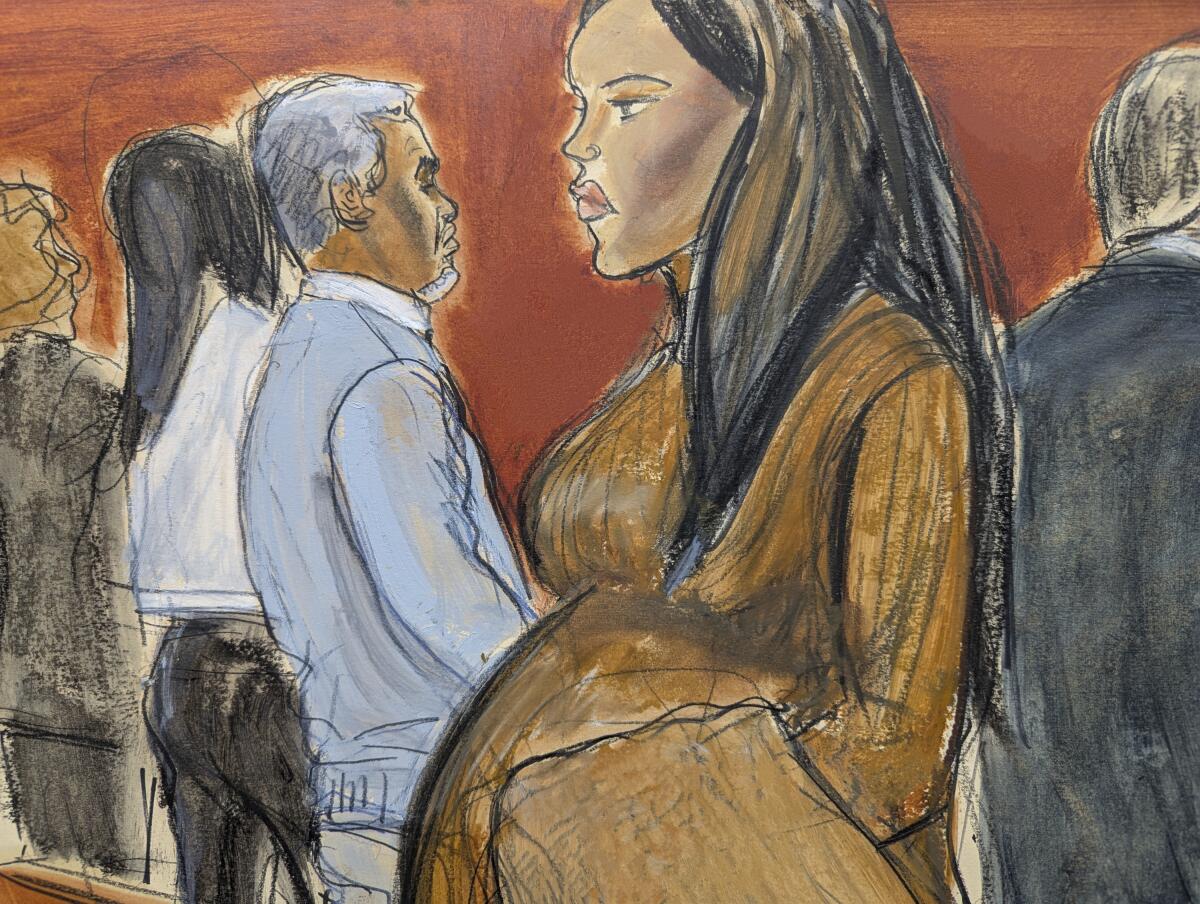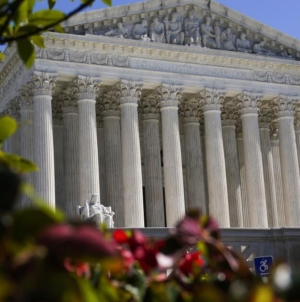-
Europe like a sauna amid scorching heat wave - 22 mins ago
-
2025 MLB All-Star Voting: Leaders and finalists to start the game - 25 mins ago
-
Man Admits to Shooting Girlfriend, Burying Her in Backyard: Police - 29 mins ago
-
Supreme Court turns down claim from L.A. landlords over COVID evictions ban - 58 mins ago
-
Report: Mavericks Mentioned as Possible LeBron James Trade Destination - about 1 hour ago
-
Steelers, Dolphins Swap Stars: Ramsey, Smith to Pittsburgh; Fitzpatrick to Miami - about 1 hour ago
-
Humanoid robots play soccer in China - about 1 hour ago
-
Melon Season Has Begun with Increased Exports and Sharp Decline in Imports - about 1 hour ago
-
Nearly 150,000 pounds of bologna recalled due to undeclared “meat or poultry source materials” - about 1 hour ago
-
Charlize Theron slams Jeff Bezos wedding while stars praise his ex-wife - about 1 hour ago
Testimony against Sean Combs was shocking and graphic. But was it enough to convict?
One of the most sensational celebrity trials in decades is expected early this week to go to jurors, who must decide whether music mogul Sean “Diddy” Combs is responsible for a shocking series of alleged sex crimes and conspiracies dating back years.
The trial in New York has been marked by graphic testimony from inside Combs’ music empire, alleging a pattern of violence, threats and cover-ups that prosecutors have likened to a mob-like criminal enterprise.
A key question posed in the case is whether Combs — who was once worth more than $1 billion — used his power and money to conceal alleged crimes, often with the help of his sprawling organization.
Prosecutors hammered home this alleged conspiracy in closing arguments. Assistant U.S. Atty. Christy Slavik told jurors Combs “counted on silence and shame” to enable and prolong his abuse and used a “small army” of employees to harm women and cover it up, according to the Associated Press.
Combs “doesn’t take no for an answer,” she added.
But legal experts have said the case may not be quite the slam-dunk that the tabloid headlines suggest.
Combs’ defense has freely acknowledged that the mogul behaved badly. They claim, however, that the charges against him are overblown and pointed out that some key witnesses did not report Combs’ misdeeds at the time.
“The theory of the defense seems to be that Diddy did really horrible things, but they don’t meet the elements of the crimes charged,” said legal expert Jeff Chemerinsky, a former federal prosecutor.
On Friday, Combs’ attorney labeled the prosecution’s case “exaggerated” and hammered some of his accusers. Marc Agnifilo claimed Combs enjoyed a “swinger” lifestyle and was addled by drugs. He admitted Combs committed domestic violence, but that the racketeering and sex trafficking charges were trumped up.
Witness Dawn Richard testifies in Manhattan federal court.
(Elizabeth Williams / Associated Press)
“He is not a racketeer,” he said. “He is innocent. He sits there innocent.”
There is no question the trial painted a damning portrait of Combs, the hip-hop star who built a massive music, fashion and lifestyle empire and mingled with the elites of American society and power. But Dmitry Gorin, a former L.A. County sex crimes prosecutor, said jurors will have to determine whether the sheer volume and seriousness of federal charges match the evidence. Gorin questioned whether federal prosecutors overcharged in the high-profile case.
The federal indictment alleges that Combs and his associates lured female victims, often under the pretense of a romantic relationship. Combs then allegedly used force, threats of force, coercion and controlled substances to get women to engage in sex acts with male prostitutes while he occasionally watched in gatherings that Combs referred to as “freak-offs.” Combs gave the women ketamine, ecstasy and GHB to “keep them obedient and compliant” during the performances, prosecutors say.
Combs’ alleged “criminal enterprise” threatened and abused women and used members of his enterprise to engage in sex trafficking, forced labor, interstate transportation for purposes of prostitution, coercion and enticement to engage in prostitution, narcotics offenses, kidnapping, arson, bribery and obstruction of justice, prosecutors said. In bringing so-called RICO charges, prosecutors in opening statements said Combs was helped by a cadre of company employees, security staff and aides. They allegedly helped organize the freak-offs and then covered up the incidents.
Combs is charged with one count of racketeering conspiracy, which carries a maximum sentence of life in prison; two counts of sex trafficking by force, fraud or coercion, which carries a maximum sentence of life in prison and a mandatory minimum sentence of 15 years in prison; and two counts of transportation to engage in prostitution, which carries a maximum sentence of 10 years in prison.
Jurors heard from 34 witnesses, who provided six weeks of brutal and graphic testimony.
At the heart of the case are three women who described graphic sexual assaults, including Combs’ onetime lover Casandra “Cassie” Ventura, who the defense acknowledged was a key witness for prosecutors.

Cassie Ventura in court.
(Elizabeth Williams / Associated Press)
It was Ventura’s lawsuit in 2023 that set off the unraveling of Combs’ enterprise with its details of sex, violence and freak-offs. Witnesses testified that Combs gave the women ketamine, ecstasy and GHB to keep them compliant during the performances.
His last former girlfriend, referred to only as Jane in court, described how the freak-offs and coerced sex continued even after the lawsuit and a raid by Homeland Security Investigations in 2023 until his arrest last year. A former employee, testifying under the pseudonym Mia, also testified that she was sexually assaulted.
The federal indictment alleges that Combs and his associates lured two of the women under the pretense of a romantic relationship. Combs then allegedly used force, threats of force, coercion and controlled substances to get women to engage in sex acts with male prostitutes.
R&B singer Ventura, who had a long relationship with Combs, testified early in the trial.
Ventura told jurors she felt “trapped” in a cycle of physical and sexual abuse, and that the relationship involved 11 years of beatings, sexual blackmail and a rape.
She said Combs threatened to leak videos of her sexual encounters with numerous male sex workers while drug-intoxicated and covered in baby oil as he watched and orchestrated the freak-offs.
One of those alleged freak-offs led to an infamous hotel beating, Ventura testified. Video from that March 2016 night shows Combs punching and kicking Ventura as she cowers and tries to protect herself in front of an L.A. hotel elevator bank. He then drags her down the hall by her hooded sweatshirt toward their hotel room.
A second angle from another camera captures Combs throwing a vase toward her. She suffered bruising to her eye, a fat lip and a bruise that prosecutors showed was still visible during a movie premiere two days later, where she donned sunglasses and heavy makeup on the red carpet.
A cover-up then ensued, according to prosecutors. Ventura stated that the police visited her apartment. She answered a few of their questions, but told the jury she still wanted to protect Combs at the time.
“I would not say who I was talking about,” she told the jury. “In that moment, I did not want to hurt him in that way. There was too much going on. It was a lot.”
Eddie Garcia, the InterContinental Hotel security guard, testified that Combs gave him a brown paper bag containing $100,000 in cash for the video.

Sean Diddy Combs in court.
(Elizabeth Williams / Associated Press)
Garcia said that after his supervisor agreed to sell the video recording, he met with Combs, Combs’ chief of staff, Kristina Khorram, and a bodyguard. After Garcia raised concerns about the police, he said Combs called Ventura on FaceTime, handed him the phone and told Ventura to tell Garcia that she also wanted the video “to go away.” After that, Garcia said he took the money and split it with co-workers, according to reporting from inside the courtroom.
Prosecutors allege this shows the conspiracy.
In her closing argument, Slavik said racketeering law applies when someone commits crimes as part of a group, and in Combs’ case, “the defendant was a powerful man, but he became more powerful and dangerous because of his inner circle, his businesses — the enterprise,” she told jurors, according to AP.
Under the Racketeer Influenced and Corrupt Organizations Act, known as RICO, there are 35 specific offenses, including murder, bribery and extortion, and federal prosecutors need to show a pattern involving at least two overt acts as part of a criminal enterprise.
People typically think of the mob, street gangs or drug cartels. But any loose association of two or more people is enough, like Combs’ entourage, said Neama Rahami, a former federal prosecutor and defense attorney.
While the testimony against Combs was graphic and detailed, Rahami said the defense hopes jurors will question why those on the stand did not report the behavior to authorities at the time and in some cases stayed in Combs’ orbit.
Rahami said she found parts of the prosecution’s case underwhelming, especially given the complex and serious charges they filed.
“I still think Combs is guilty, but the defense has a good chance of securing not guilty verdicts, especially on the sex trafficking counts,” she said.
The defense was aggressive in cross-examination, hammering witnesses about why they did not report Combs at the time or simply leave him. They also presented text messages of support and love after the alleged attacks. The defense also focused on the money and other things they got from Combs.
“This isn’t about a crime. This is about money. It’s about money,” Agnifilo said, according to the AP.
But the level of graphic testimony might be hard for jurors to ignore.
Bryana Bongolan, a friend of Ventura, testified that Combs dangled her over a 17-story balcony and tossed her onto balcony furniture in September 2016.
Capricorn Clark, a former assistant to Combs, told jurors Combs forced her from her apartment at gunpoint to go with him to musician Kid Cudi’s home in December 2011. Once there, Combs and Clark entered the empty house, and then Cudi, whose real name is Scott Mescudi, showed up.
To avoid getting law enforcement involved, Clark testified, Combs ordered her to call Ventura, who was at that time Combs’ ex-girlfriend, and said they needed to convince Cudi not to snitch to the cops. “If you guys don’t convince him of that, I’ll kill all you m—,” Clark quoted Combs saying.
Cudi testified that his Porsche was later firebombed in his driveway with a Molotov cocktail.
Prosecutors got the last word Friday before the jury went home for the weekend, reminding them of the Cudi car explosion.
“He delegated and his inner circle handled the dirty work for him,” prosecutor Maurene Comey said, according to CNN. “He said he was going to blow up the car, and lo and behold, it blew up.
“For 20 years, the defendant got away with his crimes. That ends in this courtroom,” Comey added. “The defendant is not a god. He is a person.”
Associated Press contributed to this report.
Source link































